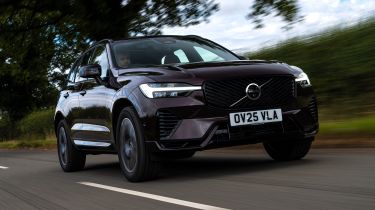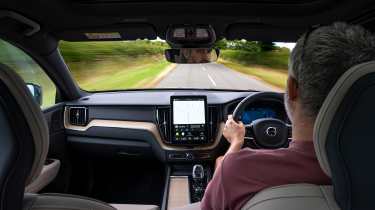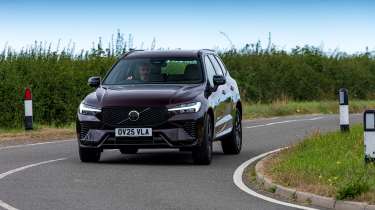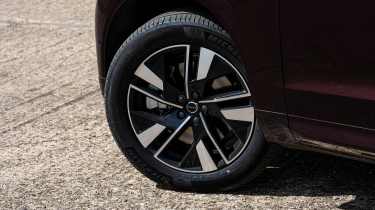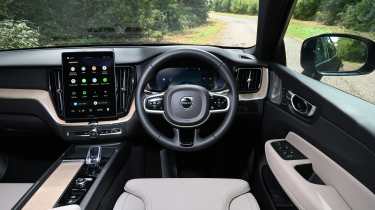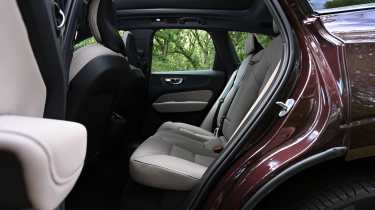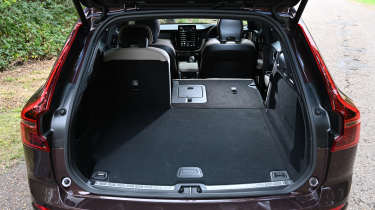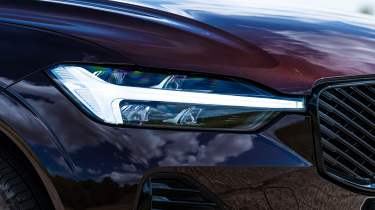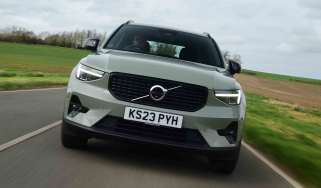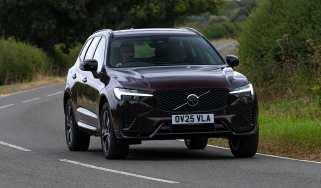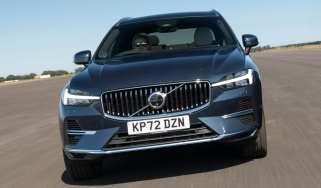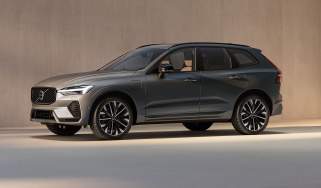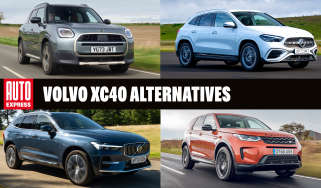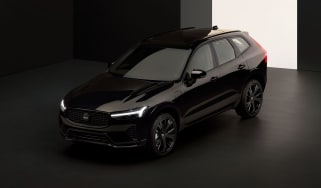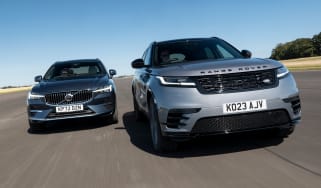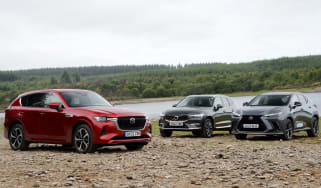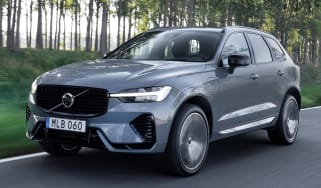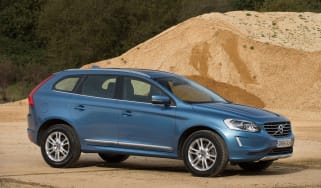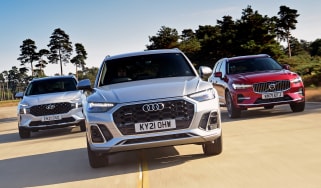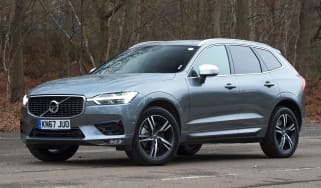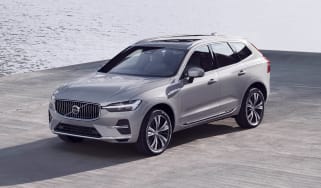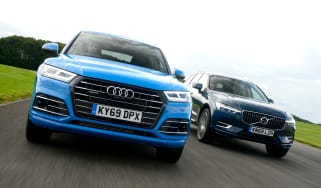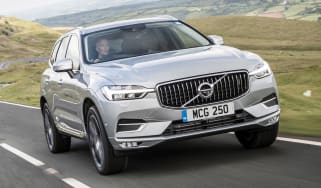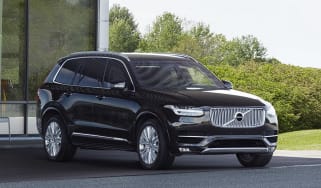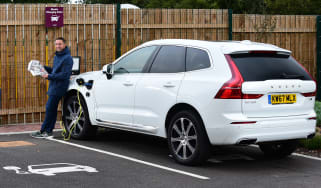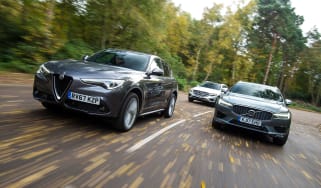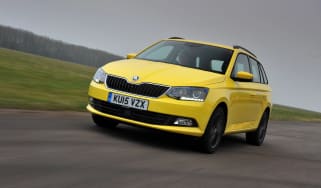Volvo XC60 review
Offering style, luxury and lots of advanced tech, there's plenty to like about the Volvo XC60

Our opinion on the Volvo XC60
The Volvo XC60 remains steadfast in its pursuit of clean, minimalist design, high-quality interior fit and finish, and overall refinement, ensuring Volvo’s biggest-selling SUV provides a different flavour to its German rivals. The updates for 2025 aren’t significant, but they do keep the XC60 feeling fresh after almost a decade on sale. The B5 is fine for those who can’t charge at home, but the T6 PHEV will make more sense to business buyers.
About the Volvo XC60
Volvo’s future might be electric, but it’s still investing in its current crop of petrol-powered models, and the popular Volvo XC60 is the latest to be revamped – with a facelift in mid-2025. Simply calling the XC60 ‘popular’ might be something of an understatement, because in June 2025, the mid-size SUV became the best-selling Volvo in history – racking up 2.7 million sales and surpassing the legendary 240.
The changes mirror the new XC90, with the XC60 gaining a more sophisticated look, a bigger touchscreen and much slicker tech. While the XC60 has been one of our favourite premium family SUVs of recent years, there are plenty of shiny new rivals to contend with, such as the fourth-generation BMW X3 and third-generation Audi Q5, both of which were launched only last year.
Used - available now

2023 Hyundai
Kona
16,178 milesManualPetrol1.0L
Cash £14,300
2022 Citroen
C3 Origin
39,670 milesManualPetrol1.2L
Cash £9,400
2025 Mazda
3
23,989 milesAutomaticPetrol2.0L
Cash £20,199
2023 MG
ZS EV
32,335 milesAutomaticElectric
Cash £14,299From the outside, there aren’t too many updates to unpack with the latest XC60. At the front, you’ll find a fresh grille design with diagonal slats that ape the ones found on the latest XC90, plus Volvo’s new logo sitting in the centre. Around to the rear, meanwhile, the lights have gained a darker tint.
Three new paint finishes – Forest Lake, Aurora Silver and Mulberry Red – are offered, giving a total of eight to choose from. There’s also a new selection of alloy wheel designs, stretching from 18 to 22 inches. Our test car sat on 21-inch wheels and featured the ‘dynamic’ (Volvo-speak for metallic) Forest Lake hue. It also had plenty of black trim – negating the redesign of the grille in one fell swoop.
There have been big changes inside, where the old screen has been replaced by a slick 11.2-inch tablet running the latest Google software. It works well and adds further premium appeal to the XC60 package. New materials boost things further.
Volvo has stopped producing diesel engines, meaning buyers can choose from a mild-hybrid petrol (B5) and two plug-in hybrid (T6 and T8) powertrains. All three versions have a 2.0-litre four-cylinder engine, with the PHEVs also having an electric motor and 18.8kWh battery.
Volvo essentially has three equipment levels for the XC60 – the entry-level Core followed by Plus and range-topping Ultra, with a Plus Pro model slotted somewhere in between. These replace the Momentum, R-Design, Inscription and Ultimate trims, which were offered earlier in the current car’s lifecycle. Prices start at just under £48,500 for a basic Core car, and stretch to nearly £70k for a top-spec PHEV.
Volvo XC60 prices and latest deals
The Volvo XC60 has been around for a long time, which means there are plenty of really enticing deals to be had via the Auto Express Buy a Car Service. At the time of writing, there are loads of leasing options for less than £500 per month, including the desirable Black Edition model with its dark trim and black wheels. Ultra cars start at around £630 per month.
Performance & driving experience
Pros |
|
Cons |
|
The Volvo XC60’s Scalable Product Architecture (SPA) platform means it shares a lot of parts with the larger XC90 SUV, and both models also use the same set of four-cylinder engines.
Only available in all-wheel-drive guise, the XC60 is still offered with the B5 powertrain, which mates a 2.0-litre petrol engine to a mild-hybrid system for 247bhp and 350Nm of torque. There’s also a T6 with another 2.0-litre four-cylinder petrol – although this is a plug-in hybrid with an 18.8kWh battery, sending power to an electric motor for a total of 345bhp. The T8 has the same PHEV set-up as the T6, boosted to 449bhp.
In typical Volvo fashion, there’s not a huge array of driving modes to choose from. In some ways this is a refreshing approach, because it seems like the firm knows its customers aren’t overly interested in endlessly configuring their cars, particularly in relation to performance. In the PHEVs, you can switch between Pure (which relies solely on the electric motor), Power (which pumps out the maximum power at any one time) and Hybrid, which attempts to best balance the two power sources.
It’s in hybrid mode where the XC60 T6 and T8 do their best work. We found there’s plenty of electric power for steady town and country driving, and when the engine is required, it’s a pretty seamless transition, aside from a distant hum. The silent EV running is very well suited to the laid-back character of the XC60, too.
There are three modes for battery usage as well, with Auto, Charge and Hold. In Charge, the XC60 recharges the battery from brake regeneration (which itself can be modulated from one-pedal driving to a simulation of engine braking). We found that after 15 minutes in this mode, we added an impressive six miles of electric range.
The Volvo XC60 B5 is only a mild hybrid, feeling predominantly petrol-powered even at low speeds. It’s pretty refined on the motorway, but this – like the T6 and T8 – is a car that suits a more relaxed driving style, even if it is sprightly enough in a straight line.
The steering is lighter in the Scandinavian SUV than in its rivals, but it’s well weighted and gives you confidence in placing the car. It does lag behind rivals such as the BMW X3 and the now-defunct Jaguar F-Pace when it comes to dynamic ability and enjoyment, but in this class, that’s not such an issue, because owners will be more interested in ride comfort. It’s a shame, then, that the XC60 also feels a little harsher than the X3 on rougher roads – especially on the standard steel springs.
| Model | Power | 0-62mph | Top speed |
| Volvo XC60 B5 | 247bhp | 6.9s | 112mph |
| Volvo XC60 T6 | 345bhp | 5.7s | 112mph |
| Volvo XC60 T8 | 449bhp | 4.9s | 112mph |
Performance, 0-60mph acceleration and top speed
It might be a premium mid-size family SUV, but the XC60 is surprisingly no slouch. Every XC60 features all-wheel drive, has a top speed of 112mph, and even the mild-hybrid B5 petrol model can do 0-62mph in 6.9 seconds. The Volvo XC60 B5’s four-cylinder turbocharged engine produces 247bhp and 350Nm of torque.
Volvo's line-up of plug-in hybrids includes the 345bhp T6 and the 449bhp T8 models, which also produce 659Nm and 709Nm of torque, respectively. The Recharge T6 can sprint to 62mph in 5.7 seconds, while the more potent T8 will complete the same benchmark sprint in 4.9 seconds.
The electric motor in the plug-in hybrid XC60s produces more than enough power for when you’re driving at low speeds around town. And when the engine does come to life, it’s almost seamless, with just a slight hum alerting you to its presence.
Town driving, visibility and parking
Visibility all around is good, making the car easy to drive around town, although myriad sensors and cameras are there to protect you. The light steering also helps, although we found the ride to be a bit brittle during our time with a B5 on passive dampers. If you can afford the premium, we’d select the optional air suspension for a plusher drive.
Country road driving and handling
The XC60 is not a car you’ll relish throwing down your favourite country road. A BMW X3 is not only more comfortable, it’s far superior when it comes to dynamic capabilities too. All-wheel drive is standard on the XC60, so grip is good, but the light steering and soft suspension mean it’s better suited to a more leisurely pace.
Motorway driving and long-distance comfort
The motorway feels like the XC60’s stomping ground, where strong refinement and reasonable comfort make it a solid choice for long journeys. While the engines can sound a bit coarse, all versions get up to speed quickly and settle nicely into a relaxed cruise. The gearbox doesn’t always kick down as quickly as you might like, however, and there aren’t any paddles on the steering wheel to speed things up.
“We would absolutely spend the extra on the optional air suspension system. Without it, we found the Volvo XC60 can feel quite unsettled, which is a shame for something seemingly geared towards comfort”. - Richard Ingram, deputy editor.
MPG & running costs
Pros |
|
Cons |
|
Volvo no longer offers the XC60 with a diesel engine. An electric EX60 is on the way, but for now buyers must make do with a choice of a mild-hybrid petrol engine or two plug-in hybrids (PHEVs).
The B5 mild-hybrid is cheaper and doesn’t require you to plug it in to charge it. At the heart of the system is a starter/generator that uses 48V technology to harness electricity that would otherwise be wasted under braking, and then gives it back to the engine during acceleration. The idea is that this energy helps the car to improve fuel economy, without the need to plug it in.
According to Volvo, the mild-hybrid XC60 will average 37.7mpg. While that might not sound particularly impressive, during our time with the car we came very close to that figure – and without really trying. CO2 emissions stand at 170g/km.
If you do have somewhere you could charge a car, but aren’t quite ready to make the switch to electric, the two plug-in-hybrid XC60s could be the solution. The XC60 Recharge T6 and T8 both pair a 2.0-litre four-cylinder petrol engine with an electric motor and an 18.8kWh battery.
Volvo quotes between 200 and 300mpg but you’ll need to plug the car in religiously to get anywhere close to that. Fail to do so and you’ll average near to 30mpg – as we experienced first-hand during our group test with an XC60 Recharge T6, Lexus NX 450h+ and Mazda CX-60 e-Skyactiv. With their batteries depleted, the Volvo returned 32.6mpg, compared with 42.3mpg from the Mazda and a very impressive 48.9mpg from the Lexus, which works as a full hybrid once the main PHEV system battery is flat.
CO2 emissions for the two PHEVs stand at 23g/km, meaning an appealing nine per cent Benefit-in-Kind (BiK) company-car tax rating. But the mild-hybrid B5 has much higher emissions and therefore sits in the maximum 37 per cent bracket. Of course, neither can match the rock-bottom three per cent rate electric cars like Volvo’s new EX30 and EX90 attract for the time being.
If you decide to buy a second-hand XC60, you may get one with a B4 diesel motor, which emits from 167g/km of CO2 and returns 39.2-44.1mpg on the combined cycle. During our own testing with an XC60 B4 we managed to average 38.8mpg, which is pretty close to the manufacturer's figures. Another discontinued option is the B6 petrol model which will require more trips to the fuel station because Volvo says it can achieve an average of 34mpg at best.
| Model | MPG | CO2 | Insurance group |
| Volvo XC60 B5 | 37.7mpg | 170g/km | 34 |
| Volvo XC60 T6 | 313.9mpg | 23g/km | 39 |
| Volvo XC60 T8 | 282.5mpg | 23g/km | 41 |
Electric range, battery life and charge time
The original XC60 ‘Recharge’ launched with an 11.6kWh battery, but it was increased to 18.8kWh as part of a series of updates in 2022. Only 14.9kWh of that is a usable capacity, but it means both the T6 and T8 can manage almost 50 miles on electric power alone. Rivals like the latest BMW X3 can trump that, but not by much.
Fully recharging the XC60 Recharge’s battery takes about three hours using a typical 7kW home wallbox. Like the majority of European plug-in hybrids, the XC60 Recharge doesn’t offer any rapid-charging capabilities.
| Model | Battery size | Range | Insurance group |
| Volvo XC60 T6 | 18.8kWh | 50 miles | 39 |
| Volvo XC60 T8 | 18.8kWh | 50 miles | 41 |
Insurance groups
The mild-hybrid Volvo XC60 sits in insurance groups 34-38 (out of 50), depending on the trim level you go for. Meanwhile the XC60 T6 lands in group 39 and the more powerful T8 sits in group 41, regardless of the specification.
Tax
Every version of the XC60 costs more than £40,000, so unless you’re looking at one from pre-2020, you’ll be paying the additional luxury car tax surcharge of £425 per year (£620 total) for the first five years. There is no longer any discount for ‘alternative fuel’ cars, so the plug-in hybrids are also liable for the extra charge.
Depreciation
The XC60 holds on to its value reasonably well. According to our latest expert data, the basic B5 Core will retain around 51 per cent of its value over three years and 36,000 miles, while the top-spec T8s hold onto around 46 per cent. The latest BMW X3 and Audi Q5 fare slightly better, with each variant set to retain more than 50 per cent of its original list price over the same timeframe.
Interior, design & technology
Pros |
|
Cons |
|
The second-generation XC60 was launched back in 2017 and has received a steady stream of updates ever since, including powertrain tweaks, trim-level restructuring and a couple of mid-life facelifts. The XC60 is less dramatic-looking than a Range Rover Velar or Lexus NX, but the Volvo is still very handsome – especially after its nip and tuck in 2025.
It shares plenty of elements with the larger XC90 as well, including the ‘Thor’s Hammer’ headlights, muscular haunches and a Volvo badge that sits proudly in the centre of the large grille.
Volvo put a lot of work into its cabin designs for that recent update, bringing some much-needed wow factor to the range. The materials feel premium, and it’s really hard to fault the build quality. We particularly like the sturdy feel of the door handles and the steering-column stalks, while the driving position has loads of adjustment and the seats themselves are supremely comfortable.
Interior and dashboard design
Volvo implemented a second facelift in 2025 to see the petrol and hybrid-powered XC60 through to the end of the decade. The big changes come inside, where the SUV has taken a huge leap when it comes to quality materials and fit and finish.
In terms of technology, the XC60 features a large portrait-oriented touchscreen in the centre of the dash – which we talk about further down – and there’s a digital driver’s display behind the steering wheel. The latter isn’t as sharp as its rivals’ set-ups, and the information isn’t as well presented.
Materials and build quality
As mentioned, the latest XC60 really upped its game when it comes to interior quality. The main screen looks great and works well, while the relatively thin seats are surprisingly supportive. New Quilted Nordico and Navy Herringbone Weave interior decor options really lift the interior ambience, helping it keep pace with newer rivals.
Infotainment, sat-nav and stereo
When the current XC60 was first launched, it came with a rather dinky seven-inch touchscreen. This was replaced soon after with a nine-inch unit, but now there’s a new 11.2-inch, portrait-orientated touchscreen slapped on the dash. And yes, “slapped” really is the best way to describe it, because while those older units were embedded within the dashboard itself, the size of the new display means it sits out rather prominently.
The new touchscreen is exactly the same as you’ll find in the updated XC90 and comes with an identical infotainment set-up. Powered by a new Qualcomm Snapdragon processor, the XC60 loads its menus and responds to inputs quickly. But rather than copying the dazzling ‘everything, everywhere’ layout of Mercedes’ MBUX or the near-infinite configurability of BMW’s iDrive, the Volvo system is quite minimalistic.
The firm says it’s been designed to require fewer taps to reach your desired menu, which is just as well because there are no physical shortcut buttons. What we do like about the set-up is the main screen, which sensibly prioritises the Google-based sat-nav. The audio and smartphone connectivity tab appears below, and while a tap of the always-available home button gets rid of it – and increases the size of the map – it always reappears when you jump back from sub-menus.
Along with Google Maps, Google Assistant also comes built-in, with more apps available through the Google Play store, and over-the-air updates taking care of upgrades in future. The XC60 isn’t just for Android users, either, because Apple CarPlay also features, although it doesn’t look as well integrated as the Android set-up. Volvo says it has improved the wireless charging pad, and we’re happy to report our smartphone never got unacceptably hot during charging.
“A big interior upgrade in 2025 was exactly what the Volvo XC60 needed. We love the new screen, and the cool Scandi-inspired materials really lift the interior ambience. We think it’s one of the classiest cabins in the segment”. - Richard Ingram, deputy editor.
Boot space & practicality
Pros |
|
Cons |
|
The XC60 lacks the XC90’s seven-seat option, but aside from the Land Rover Discovery Sport and mainstream alternatives like the Hyundai Santa Fe, so do most of this car’s direct rivals.
There’s still enough space for the whole family to be comfy and haul a decent amount of luggage at the same time. The modern cabin design is also practical; the glove compartment and front door bins are huge, and there’s a long sliding cover in the centre console that hides two cup-holders and some additional storage space.
We did find that the rear door bins are a little pokey and the XC60’s climate controls are also a pain to access. Plus, as with other current Volvos, once turned on, the interior fans are irritatingly loud, even in their lowest settings.
Dimensions and size
The Volvo XC60 measures 4,708mm long, 1,902mm wide and 1,658mm tall, which means it’s smaller overall than a BMW X3, but give or take a few millimetres here or there, almost exactly the same size as the latest Audi Q5.
Either way, while it’s a big car, the XC60 manages to hide its size well on the road, aided by the large amount of glass that provides excellent all-round visibility. Big door mirrors also help, while the Volvo’s traditionally square shape – rounded off more than ever on the XC60 – still makes it easier to judge where all four corners of the car are compared with some rivals.
| Dimensions comparison | |||
| Model | Volvo XC60 | BMW X3 | Audi Q5 |
| Length | 4,708mm | 4,755mm | 4,717mm |
| Width | 1,902mm | 1,920mm | 1,900mm |
| Height | 1,658mm | 1,660mm | 1,647mm |
| Wheelbase | 2,865mm | 2,865mm | 2,832mm |
| Boot space | 468 litres | 570 litres | 520 litres |
Seats & passenger space
The XC60’s dimensions translate to decent interior space for driver and four passengers, with good knee, shoulder and headroom in the back once you’re inside. However there’s a transmission tunnel in the back that’s both high and wide, and it makes sitting in the middle seat a bit of a short-straw affair.
The rear headrests are well placed and comfortable. They also fold down at the touch of a button on the touchscreen. There’s also two sets of ISOFIX mounting points in the rear that are easily accessible behind folding covers.
Boot space
The regular XC60 has a 483 litre boot, while the plug-in hybrid version can carry up to 468 litres with the rear seats in place. That’s a decent amount, but less than you get in any Lexus NX, and non-electrified versions of the BMW X3.
The standard-fit powered tailgate lifts high out of the way, leaving a wide opening that’s very handy, while the air suspension on top-spec models can drop the rear of the car by 40mm at the press of a button.
The rear seats are easy to fold and go down completely flat in a 60:40 formation, plus there’s a ski hatch that allows you to load longer items without sacrificing either of the outer rear seats. You can specify a spare wheel under the boot floor as an option, along with a handy reversible mat with carpet on one side and plastic on the other; it’ll even fold out to protect the rear bumper when loading and unloading.
Folding the Volvo’s rear seats down expands the luggage capacity to 1,410 litres in the base model and 1,395 litres in the plug-in XC60.
Towing
The Volvo XC60 has a solid range of towing capacities, varying according to which engine you opt for. The maximum an XC60 is rated to tow is 2,400kg and this top braked-trailer towing capacity is available with the entry-level mild-hybrid B5. The Recharge T6 and T8 Recharge plug-in hybrid models have a 2,250kg towing limit.
“We found the Volvo XC60 spacious enough for a family of four, with very little trade off in terms of boot capacity if you go for one of the plug-in hybrids. Our B5 test car even had a spare wheel in the boot – when was the last time you saw one of those?” - Richard Ingram, deputy editor.
Reliability & safety
Pros |
|
Cons |
|
Volvo’s focus on safety means the XC60 is fitted with lots of potentially life-saving equipment as standard. All versions feature autonomous emergency braking (AEB), lane-keeping assist, dual-stage airbags and traffic-sign recognition, while there’s also a system called oncoming lane mitigation, which steers away from oncoming traffic to avoid a head-on collision.
The XC60 put in a very impressive performance during its Euro NCAP crash tests in 2017 and received the industry body’s full five-star overall rating. It was also awarded a 98 per cent score for the adult occupant protection and a 95 per cent in the safety assistance technology. Frustratingly, it hasn’t been tested since.
Unfortunately, the XC60 didn’t make it onto our list of the best cars to own this year, although the smaller XC40 managed to crack the 50-car list and finished 37th. Meanwhile, Volvo as a brand came 13th (out of 31) in our best car manufacturer rankings, which is also based on owners’ feedback from our most recent Driver Power customer satisfaction survey.
All new Volvos are covered by a three-year/60,000-mile warranty, which is the same amount of coverage you get with any new Audi, but doesn’t match the unlimited-mileage cover of BMW and Mercedes’ three-year factory guarantees. Nor can it come close to the level of cover offered by many of the new Chinese car brands – despite Volvo being owned by global car giant (and Chinese powerhouse) Geely.
Servicing your Volvo XC60 should be fairly straightforward. The XC60 needs a service once a year or every 10,000 miles, and fixed-price plans are available.
| Euro NCAP safety ratings | |
| Euro NCAP safety rating | 5 stars (2017) |
| Adult occupant protection | 98% |
| Child occupant protection | 87% |
| Vulnerable road user protection | 76% |
| Safety assist | 95% |
Buying and owning
- Best buy: Volvo XC60 T6 Core
The basic XC60 in Core specification comes pretty well equipped, so unless you really want or need the sportier look of higher-end models we’d keep things simple and opt for the entry-level version. Upgrading to the T6 plug-in hybrid could be worthwhile, however; it could save you money in the long run and it’s a much nicer car to drive.
Volvo XC60 alternatives
There are loads of cars in this class, and while the XC60 is far from the worst, plenty of rivals are more modern, or offer a better blend of performance and comfort. The latest BMW X3 is a prime example of this, while the talented Audi Q5 is better now than it’s ever been. The hybrid-only Lexus NX offers a different take on the formula, while the Mercedes GLC – now available with combustion engines as well as an intriguing ‘EQ Technologies’ EV powertrain, is worth a look.
Frequently Asked Questions
Volvo only offers three years or 60,000 miles worth of cover, which in this day and age isn’t particularly generous.
Deals on the XC60 and alternatives

